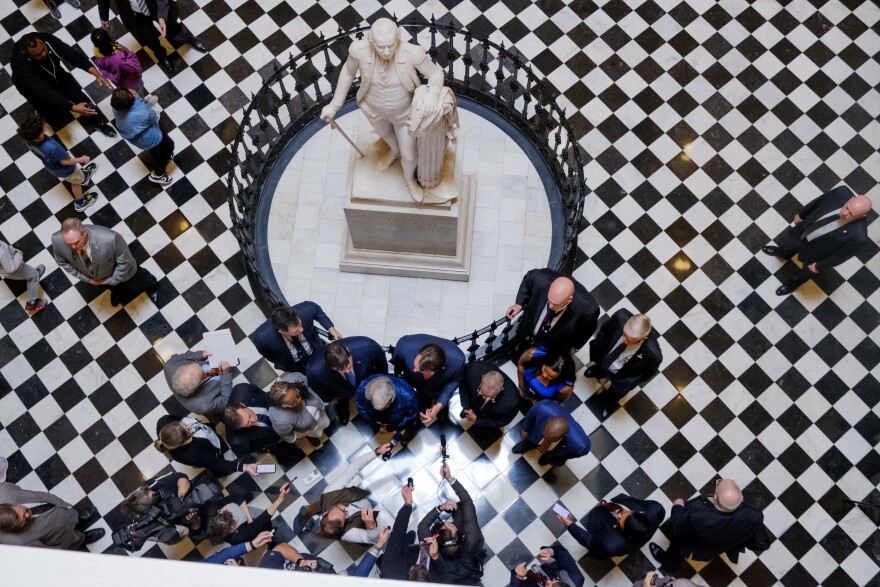With Virginia’s tax season passed, the commonwealth’s budget planners will soon have data to answer a key question: Can everyone get what they asked for?
On Tuesday, lawmakers involved in the budget writing process met with Republican Gov. Glenn Youngkin, who was briefed by Finance Secretary Steve Cummings earlier in the day.
“We still have an aspiration to present a budget that meets the multiple objectives of the General Assembly and the governor's office by next week. And that's what we're working towards this week,” said Youngkin. “As I said, we still got work to do. But I'm optimistic.”
The governor wants a two-year budget that doesn’t raise taxes. He had originally proposed an income tax cut, mitigated by an expanded sales tax, that would have cut taxes by $1 billion.
The Democrat-led legislative leadership want more money for schools and proposed a digital tax — similar to one Youngkin had in his sales tax expansion — to fund it.
Between the budget passed by the General Assembly and Youngkin’s amendments, there’s about a $1 billion difference per year. (Virginia’s fiscal year runs from July 1 through June 30.) But that’s also a similar figure to the high end of March projections for extra revenue: tax collections beyond what budget planners accounted for in fiscal 2024.
“That's a really positive sign, “ said Ashley Kenneth, president of the progressive-leaning Commonwealth Institute for Fiscal Analysis. “But it's important to remember that there are still three months left in the fiscal year that are significant for revenue collections.”
April’s revenue won’t be public until mid-May, just as the General Assembly reconvenes May 13 for a special session to propose and vote on a budget, but tax officials monitor revenue coming in daily.
Through March 31, revenues ran $1.06 billion above the forecast, but $656 million of that came from refunds and nonwithholding revenues, according to a Youngkin official: These funds are more difficult to predict, mostly collected in April, May and June — and have been impacted by a recently enacted tax.

While tax relief in recent years was available in part due to massive amounts of federal COVID relief and cautionary budgeting during the pandemic, the current surpluses have been driven by an economy that defies expectations.
The Federal Reserve Bank of Richmond said the region, which also includes Maryland, West Virginia and the Carolinas, grew at a slight pace. Employment grew but at a slower, “modest” pace than before, and wages and prices continued to grow at a “moderate rate.”
Kenneth said the Democrats’ digital tax is still necessary, even if progressive policies are funded through the excess revenue.
“Having new revenue streams, like the new economy sales tax, are still needed,” she said, referring to the sales and use tax on digital goods. “They're going to make ongoing impactful investments in our communities, as opposed to these one time funds.”
Andrey Yushkov, an analyst at the conservative-leaning Tax Foundation, says that expanding the sales tax — especially if it is expanded to business-to-business transactions — would impact lower-income earners more.
“There is this tax pyramid-ing that occurs. Your business pays the tax, then the business that sold something to your business also pays the tax, and then you as a final consumer also pay the tax,” he said.
Most states tax consumer and business transactions that involve digital goods, according to The Commonwealth Institute.
In an era of divided government, $5 billion of relief under Youngkin has combined tax cuts — favored by the governor — and tax rebates preferred by Democrats wary of long-lasting cuts. For fiscal years 2023 and 2024, about $2 billion of the tax relief was from one-time rebates.
“If you use temporary policies, like individual income tax rebates, then people don't know what to expect,” said Yushkov. “It depends on multiple factors that are external to business owners themselves. So they cannot plan accordingly.”
While the digital tax may not make it through this session, Speaker of the House Don Scott (D–Portsmouth) said it could still be in Virginia’s future.
“Whether we are able to do that this cycle or not, it is going to happen,” Scott told VPM News during an April interview, before budget negotiations were extended.



